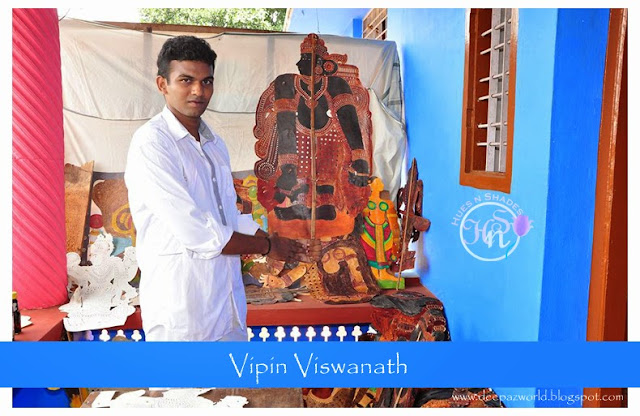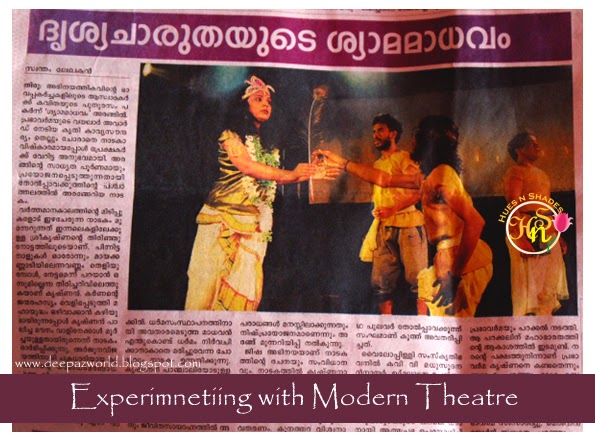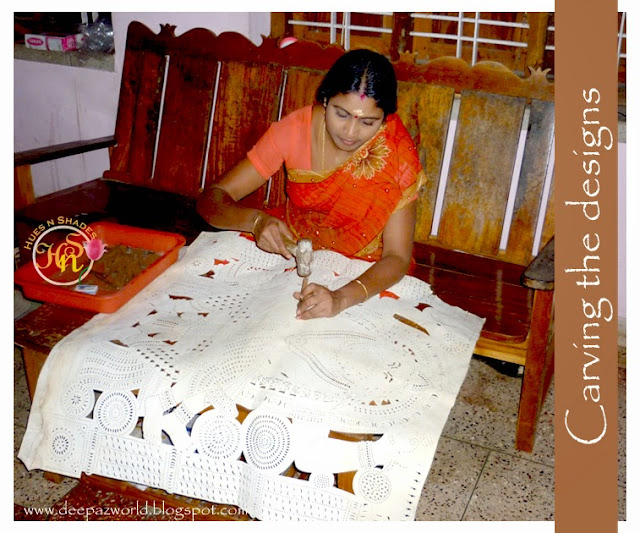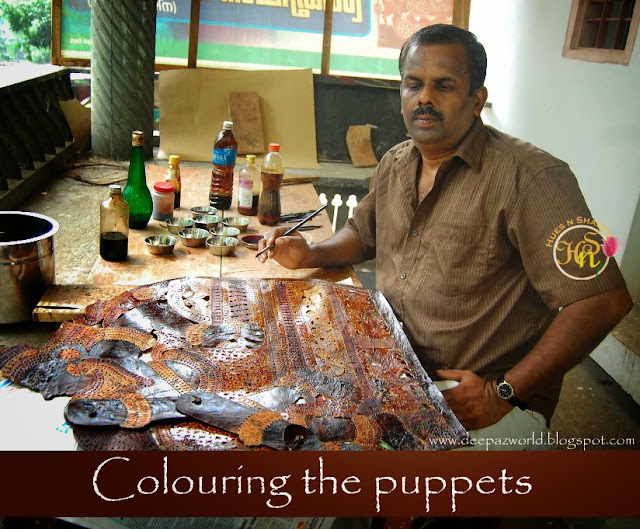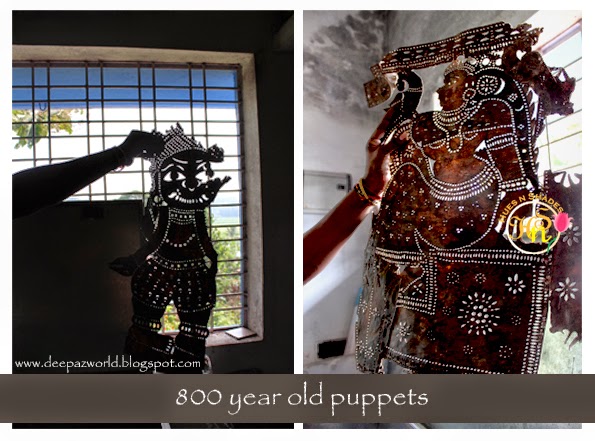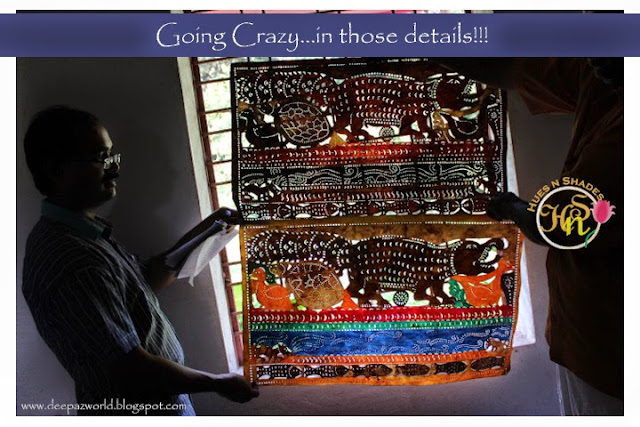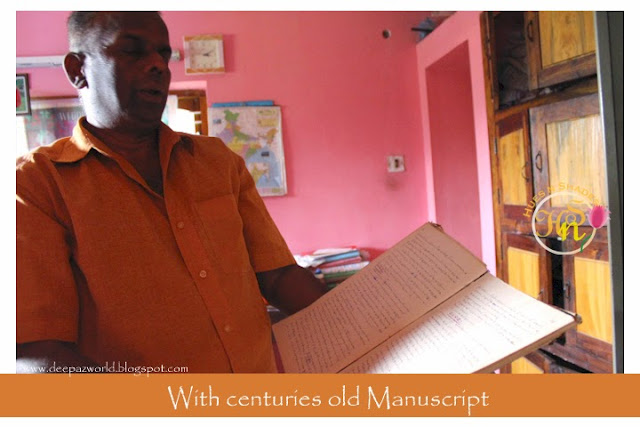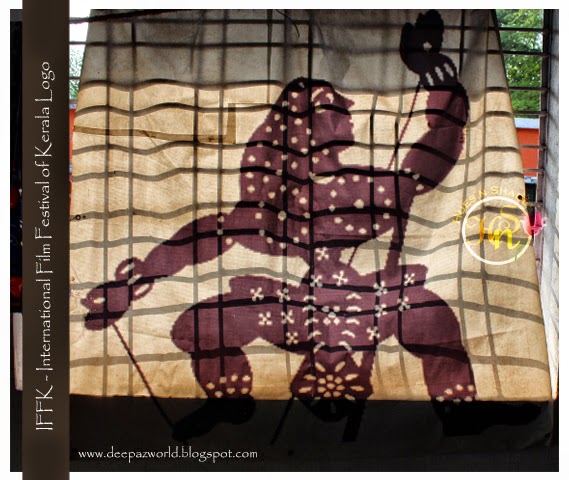It was the time when the
youngest, Mr.Vipin Viswanath, who carried forward the tradition had gone to
China as the sole representative of India to participate in the 4th
International Folk Festival when I had gone to interview the family. He was
invited by the Chinese Government to conduct seminars, workshops and demonstrations.
Though engineering was the area that he wished to gather his knowledge, unlike
the usual families, his' wanted him to pursue something else that would
help him to carry forward their traditional art too and that’s how he completed
his M.A and is currently pursuing M.S.W. Their daughter, Vijitha, now married
is also a torch-bearer of the tradition lives in Dubai with her husband.
Tholpavakoothu
(Shadow Puppet play) has been in the family for the past 15 generations and according
to Mr. Viswanatha Pulavar – who heads and runs the show, a Post-Master by
profession, they know the past six generations by name. His brother - Mr.
Lakshmanan and wife - Mrs. Pushpalatha, also helps him in running the traditional art. One of his father’s
disciple and the now Guru was also present during this informal meet, Mr.
Ramachandran, who is now 77 yrs old and the oldest of the Tholpavakoothu
tradition. He had been in this art since he was 22 yrs old.
Pushpalatha, Viswanatha Pulavar with Guru Ramachandraji
The Origin
The story goes that when Bhadrakali defeated
the asura (demon) Dharika in the Celestial world, Lord Rama defeated the ten-headed Lankasura, Ravana
upon earth. Lord Shiva spoke of the fearsome battle that took place on earth
when Bhadrakali reached Lord Shiva with the head of the vanquished Dharika.
When she heard of this grand conquest she came upon a great urge to see the
battle. Lord Shiva asked to seat herself in Kerala, the blessed land, where her
devotees will perform this battle as a shadow puppet play each year and thus
witness this enticing epic. The Goddess accepted the advice and has been
watching this magnificent episode every year.
Tholpavakoothu – The Where and How
The art is said to be 2000 years old and is
traditionally performed for 7,14,21,41 or 72 days at temples dedicated to
Bhadrakali. A performance would normally begin at 10 pm and would go on till 6
am. A traditional art of Kerala, Tholpavakoothu portrays the tales of a
mythical age and the superlative battle where the good won over the evil.
Traditionally
Tholpavakoothu is performed in Temple stages (The screen that displays the
shadow is usually 42 feet and the back is lit by 21 lamps made of coconut
halves. The play begins by breaking 11 coconuts each day. One person holds one
puppet and there would be around 10 -15 people apart from the musicians. The
accompaniment is by percussion instruments like chenda, madhalam, elathalam
(kind of cymbals), ezhupara and the wind instruments like the conch and the
short pipe called the kurumkuzhal. Chilanga (anklet) is the most important
piece of the ensemble.



The puppets that cast
the shadows move across the screen illustrating the tale in all it’s grandeur
and majesty. Behind the white curtain which represents the sky and the black or
red curtain which represents the earth, the puppeteers move their characters to
the recital of the Tamil poet Kamba’s version of the Ramayana. The language
used is a mix of Tamil, Sanskrit and Malayalam. It is usually in the form of
questions and answers.
Tholpavakoothu is now
available in an abbreviated form where the whole epic is condensed to a short
episode that showcases the technique in a span of an hour or thirty minutes
without losing its essence. The shorter version was first introduced by Late K L
Krishnankutty Pulavar, father of Viswanatha Pulavar. He had received the
National award twice in his lifetime. Viswanatha Pulavar has received Grants
and Fellowship (Junior and Senior) from the Ministry of Culture.
The team has staged
over 5000 performances in India and abroad. They have expanded their repertoire
by including tales from the other Puranas like SriKrishnapuranam, Prahaladacharitham
and Panchatantra. They have also made unique performances like the life of a
Jain saint, Lanka Lakshmi with the NSD (National School of Drama) and the most
recent Shyama Madhavam directed by Jisha Palakkad, based on Prabha Varma’s award-winning
work, with the backdrop of Tholpavakoothu which has been described as a
fascinating and magical experience for the viewers.
'Shyama Madhavam' with Jisha Palakkad
Behind the actors can be seen the Shadow Puppet play
The Shadow Puppets
The puppets are colored with natural dyes and
sometimes with even acrylics for brighter colours when they need to be taken
abroad for several performances. The natural colours also are said to have
medicinal properties. The intricate designs are made with specific iron tools
that serve the purpose. Extremely detailed and intricate patterns are carved
out efficiently. It is these holes that give the magnificent effect when the light
passes through it; their beauty is enhanced being behind the lamp-lit screen.
There are puppets to
represent 71 characters in 4 main categories - Sitting, Standing, Walking and
Fighting. Besides these puppets, forms to depict scenes from nature, battles
and ceremonial processions are also used. The puppets all have one movable arm
and hand and some have other movable parts.
They have small as
well as big puppets which take from one day to one month to create depending on
the design involved. I even had the fortune of running my hands (fondly) on an
800 year old puppet and I literally had goosebumps!!! Imagine the
centuries-stored tales that it would have to tell !!!!
The puppeteers would
fast for 21 days before the performance as a ritual as the procedure itself is
considered divine and auspicious.
Spreading the Tradition
They are also taking the effort to spread the
tradition by helping those in research on the subject and by holding workshops
and classes to create awareness among the young and the artistically inclined.
Their home is a literal treasure trove and to be walking there was like walking
amid scholars…of present and past. It requires intense learning of the shlokas
from Vedas and Puranas if you need to become a performer of the art. They have the original manuscripts from which the
lessons are taught. Their home acts as the Gurukul for the craving learners.
Contact
The puppet is also available for
sale. You can contact them directly.
THOLPAVAKOOTHU SANGAM
Koonathara (P.O),
Kavalappara (via) Shoranur ,
Palakkad PIN- 679523 , Kerala ,
India. PH: +91 - (0)466 2227927
Mob: +91 9645816900, +91 9847358668
This is not a paid post. This is out of my sheer interest to portray the traditional arts of different places particularly my home-town that I took the trip to Tholpavakoothu Sangam and featured them here. I personally feel that they are doing an amazing job!
Many thanks & love to my hubby, Sunil.M.S, for having helped me to do the feature :)
Thanks a lot for visiting Hues n Shades...Please do leave your comments and suggestions. It means a lot to read your feedback!
Photo Credit: A few photographs were sent to me by the family while some others were clicked personally by me.
Please do not use/reproduce the content (words as well as images) without the written consent of the author.










